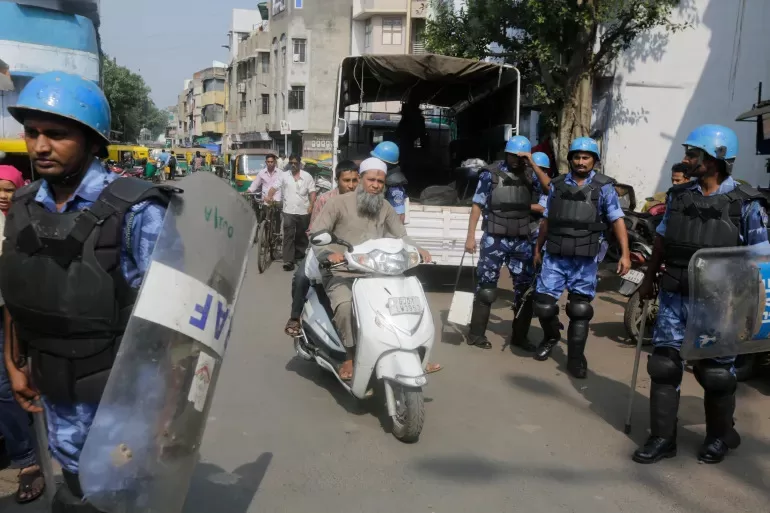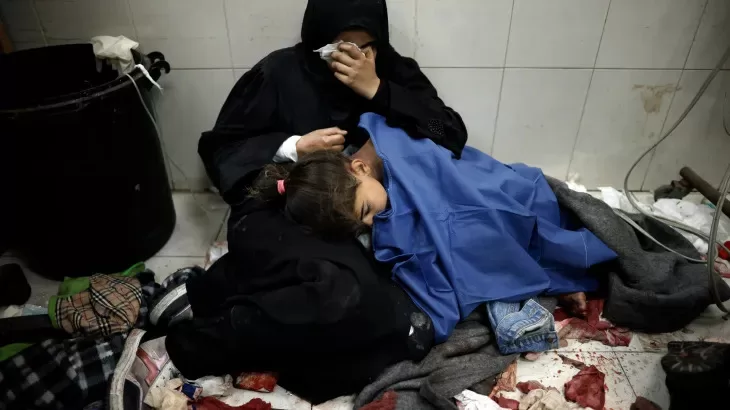Mumbai, India – Driving through the Mira Road neighbourhood of Mumbai was a usual affair for 21-year-old Mohammad Tariq, who ran errands on his father’s white loading auto carrier. But on Tuesday, participants in a Hindu nationalist rally stopped the vehicle in the middle of the road. Young boys – mostly teenagers – dragged him out. They punched and kicked him and thrashed him with batons, flag staffs and iron chains, his 54-year-old father, Abdul Haque told Al Jazeera. Since then, Haque said, “[Tariq] has been terrified.” end of list The rally, which was shared over multiple live streams, turned into a mob, targeting several Muslims in the locality, rampaging through their shops and damaging vehicles while chanting “Jai Shri Ram” (Victory to Lord Ram). Similar rallies, often to the beat of booming far-right pop music, took place outside mosques and Muslim neighbourhoods across several states in India. The trigger was the consecration of a Ram temple in the ancient city of Ayodhya in northern India by Prime Minister Narendra Modi on Monday. The temple is being built on the site where the 16th century Babri Masjid stood until 1992, when Hindu far-right mobs tore down the mosque, triggering nationwide riots that killed more than 2,000 people, mostly Muslims. Addressing the country from Ayodhya, Modi said that the “wheel of time” had turned, rejecting criticism over the increased religious tensions that have been simmering in India since he came to power in 2014. “Ram is not a problem but a solution,” he said. “We are laying the foundation of India for the next 1,000 years. We take a pledge to build a capable, grand, divine India from this moment.” Yet, as India celebrates its Republic Day on January 26, the inauguration of the temple, the Indian state’s role in it, and the violence and vandalism that religious minorities have faced since then are, to many, markers of a country that has moved away from the Constitution adopted this day in 1950. Soon after the consecration, a Muslim graveyard was set ablaze in the north Indian state of Bihar, a Muslim man was paraded naked in southern India, and a saffron flag representing militant Hinduism – was hoisted atop a church in central India. “This country is increasingly unrecognisable to me, where Muslims are like rubbish for them,” said Haque, on his way to a police station with his son after the Tuesday attack. “There were so many people [during the Mira Road attack] but no one stopped them from beating my child. It is shameful for society. It is a city of the blind.” ‘High priest of Hinduism’ The national broadcast of the temple inauguration, including the unveiling of the idol of Ram, brought India to a halt on Monday morning. Large LED screens were set up in villages, and people gathered at temples with their families to watch the ceremony live. Polarising speeches by Modi and his colleagues were broadcast in cinema theatres and on YouTube. Nilanjan Mukhopadhyay, an author and Modi’s biographer, noted that the event cast the prime minister as “the high priest of Hinduism”. “This is the origin of a new time cycle,” Modi said. “A nation rising after breaking the mentality of slavery … a thousand years from now, people will talk about this date, this moment. The Ram temple’s construction reflects Indian society’s maturity.” The union cabinet adopted a resolution to applaud the opening of the temple, stating that the country had “independence in 1947, but its soul was freed from centuries of colonial enslavement” on January 22. However, his critics say that the event was political, rather than a religious one. “It was more about Modi than Ram – a total instrumentalisation of Ram’s figure to serve the cause of an elected monarch,” said Apoorvanand, a professor at the University of Delhi. The celebrations in Ayodhya “indicate a change in the direction of the Indian state”, he added, referring to the participation of top celebrities and saints, where state-owned helicopters showered rose petals over the city. “This temple is a celebration of victory of violence against Muslims and it has been legitimised. Modi linked the source of nationhood to divinity [of Ram]; all values of the Indian republic stand destroyed.” India has been continuously slipping in international democracy indices and was tagged “partly free” for the third year in a row by Freedom House, a US government-funded nonprofit. Human Rights Watch warned last year of the Bharatiya Janata Party’s (BJP) “systematic discrimination and stigmatisation of religious and other minorities, particularly Muslims”. The chest-thumping rise of Hindu nationalism and apparent departure from secular values also pose troubling questions for India’s international allies, especially in the West, who have strengthened ties with New Delhi in recent years and view it as a counterweight to China. “Modi has now positioned India to become a Hindu state in a formal sense, a move that would be welcomed by his large base but decried by many non-Hindus and critics as a betrayal of India’s secular traditions,” said Michael Kugelman, the director of the Wilson Center’s South Asia Institute. Won’t ‘satiate the bloodlust’ Modi and the BJP appear poised for a comfortable win in the upcoming 2024 national election, according to most polls and many political observers. The PM did not need the temple opening to bolster his electoral prospects, said Kugelman, but the consecration gives him another shot in the arm. “He delivered on one of his most longstanding promises and has come through in a big way that will ripple across his electoral base – and beyond,” he added. But the construction of the temple will fail to “satiate the bloodlust” of the Hindu nationalist movement that went mainstream with the demolition of the mosque in Ayodhya in 1992, argued Apoorvanand. After the ceremony, he saw slogans being raised in his university for the demolition of other mosques contested by the far-right in the cities of Mathura and Varanasi. “There is no closure to all of this,” he said, adding that the temple

















